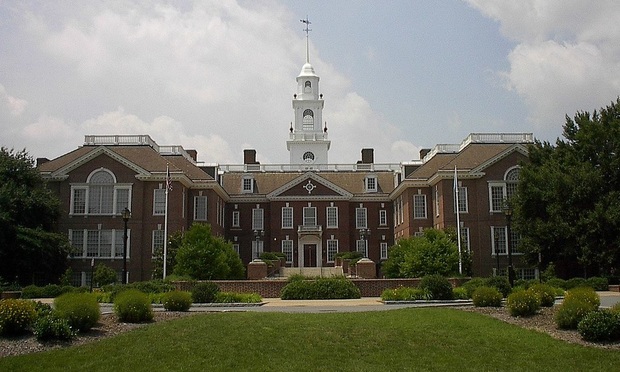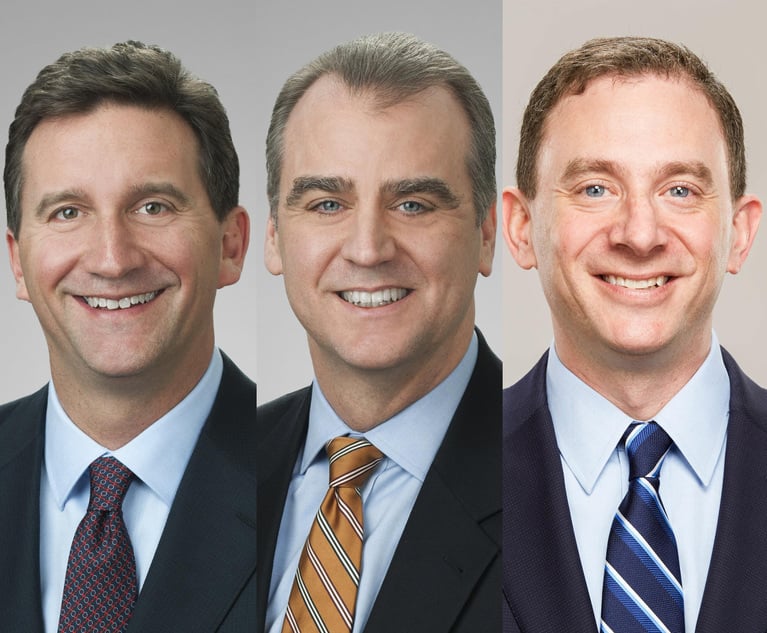Bill Aims to Charge Major Opioid Makers for Drugs Sold in the State
The measure, Senate Bill 34, would create a two-tier fee on pharmaceutical firms that produce the highest-strength and most widely distributed opioid products available for sale in Delaware.
March 13, 2019 at 05:42 PM
5 minute read
The original version of this story was published on Delaware Law Weekly
 Legislative Hall in Dover.
Legislative Hall in Dover.
Delaware lawmakers Wednesday introduced legislation that would force major drug manufacturers to help cover the costs of opioid addiction by imposing a fee on the amount of drugs dispensed in the state.
The measure, Senate Bill 34, would create a two-tier fee on pharmaceutical firms that produce the highest-strength and most widely distributed opioid products available for sale in Delaware, with the proceeds marked for a special fund to pay for treatment and prevention services.
The fee is expected to generate $8 million over three years, but would only kick in above a certain threshold, based on a formula used to calculate the strength of the drugs.
“For too long, these companies have reaped record profits while avoiding responsibility for the pain and suffering their products have caused,” the bill's primary sponsor, Sen. Stephanie Hansen, D-Middletown, said in a statement announcing the bill.
“With this bill, we will begin holding these companies accountable by forcing them to direct some of that revenue toward breaking the cycle of abuse, addiction and death,” she said.
While at least 14 other states have introduced similar legislation, only New York has passed a comparable measure. New York's Opioid Stewardship Act targeted both opioid manufacturers and distributors. However, U.S. District Judge Katherine Polk Failla of the Southern District of New York in December struck down that law as unconstitutional, finding that a provision barring companies from passing the cost on to consumers had violated the dormant commerce clause of the U.S. Constitution.
Failla's ruling, which is now on appeal to the U.S. Court of Appeals for the Second Circuit, held that the OSA unlawfully imposed a penalty on opioid sales made outside of New York, breaching a the constitutional prohibition against state laws that place an excessive burden on interstate commerce.
An earlier version of Hansen's bill had included similar language, but supporters scrapped the provision in the wake of the New York ruling. Instead, SB 34 seeks to impose an “impact fee” only on manufacturers whose products in Delaware exceed 100,000 morphine milligram equivalents, or MME, in a given quarter.
Producers of name-brand drugs would pay a fee of one cent per MME contained in each pill. For generic drug-makers, the levy would total one-quarter of a cent for every MME sold in the the First State.
For 10 milligram pills of Oxycodone—the most widely available prescription opioid in Delaware—the fee would amount to four cents for each generic pill and 15 cents for every name-brand pill sold in the state, Hansen said in an interview.
Hansen said the levy would not substantially increase the price of prescription opioids in Delaware because prices for the drugs are set nationally, and the overall fee would be “very small” compared to the profits that companies make off their products.
While individual firms could still pass the costs off on consumers, she said it would be more cost-effective for companies to just pay the fee, rather than alter the way they do business.
Hansen said she was confident her new bill avoided the constitutional pitfalls of the New York legislation, but also acknowledged that the bill could be susceptible to lawsuits from drug companies and special interests.
“I do expect some thought to be given to litigation,” she said. “Nonetheless, I'm hoping they will do the cost-benefit analysis and decide it's in their best interest to pay the small fee and be at the table” for discussions on how to solve the current crisis.
According to the bill's fiscal note, the impact fee is expected to generate $2.8 million in the 2020 fiscal year and $2.7 million and $2.5 million in the next two years, respectively.
That revenue would go to a designated “prescription opioid impact fund” to finance addiction-prevention and opioid-addiction services, including paying for overdose-reversing drugs, treatment programs, sober-living facilities and services for the under- and uninsured.
The bill is the latest effort in Delaware to combat the opioid addiction epidemic, which has been linked to 112 opioid-related deaths in 2016 alone. In 2014, 215 babies were treated for withdrawal in Delaware hospitals at a cost of $9.6 million, according to statistics included with the legislation.
Delaware is one of 30 states to sue opioid manufacturers and producers in state court for allegedly misleading doctors and consumers about the dangers of their products.
Last year's budged approved $100,000 for substance use disorder services and the overdose-reversing drug Naloxone for first responders, as well as $328,500 for 20 additional sober living beds and $990,000 for emergency room consultations. Gov. John Carney's recommended budget for the upcoming fiscal year also requests $1.8 million to expand prevention and treatment options in the state.
Hansen said she expected SB 34 to be scheduled for a Senate committee hearing in the coming weeks and hopes for a floor vote to follow by the end of March.
This content has been archived. It is available through our partners, LexisNexis® and Bloomberg Law.
To view this content, please continue to their sites.
Not a Lexis Subscriber?
Subscribe Now
Not a Bloomberg Law Subscriber?
Subscribe Now
NOT FOR REPRINT
© 2025 ALM Global, LLC, All Rights Reserved. Request academic re-use from www.copyright.com. All other uses, submit a request to [email protected]. For more information visit Asset & Logo Licensing.
You Might Like
View All
Defending Against a $290M Claim and Scoring a $116M Win in Del. Drug Patent Fight

Wilson Sonsini Knocks Out Claims Against Inhibrx Biosciences in Trade Secrets Verdict


Chancery Again Rules in Plaintiff's Favor in Earnout Provision Dispute
3 minute readTrending Stories
- 1States Accuse Trump of Thwarting Court's Funding Restoration Order
- 2Microsoft Becomes Latest Tech Company to Face Claims of Stealing Marketing Commissions From Influencers
- 3Coral Gables Attorney Busted for Stalking Lawyer
- 4Trump's DOJ Delays Releasing Jan. 6 FBI Agents List Under Consent Order
- 5Securities Report Says That 2024 Settlements Passed a Total of $5.2B
Who Got The Work
J. Brugh Lower of Gibbons has entered an appearance for industrial equipment supplier Devco Corporation in a pending trademark infringement lawsuit. The suit, accusing the defendant of selling knock-off Graco products, was filed Dec. 18 in New Jersey District Court by Rivkin Radler on behalf of Graco Inc. and Graco Minnesota. The case, assigned to U.S. District Judge Zahid N. Quraishi, is 3:24-cv-11294, Graco Inc. et al v. Devco Corporation.
Who Got The Work
Rebecca Maller-Stein and Kent A. Yalowitz of Arnold & Porter Kaye Scholer have entered their appearances for Hanaco Venture Capital and its executives, Lior Prosor and David Frankel, in a pending securities lawsuit. The action, filed on Dec. 24 in New York Southern District Court by Zell, Aron & Co. on behalf of Goldeneye Advisors, accuses the defendants of negligently and fraudulently managing the plaintiff's $1 million investment. The case, assigned to U.S. District Judge Vernon S. Broderick, is 1:24-cv-09918, Goldeneye Advisors, LLC v. Hanaco Venture Capital, Ltd. et al.
Who Got The Work
Attorneys from A&O Shearman has stepped in as defense counsel for Toronto-Dominion Bank and other defendants in a pending securities class action. The suit, filed Dec. 11 in New York Southern District Court by Bleichmar Fonti & Auld, accuses the defendants of concealing the bank's 'pervasive' deficiencies in regards to its compliance with the Bank Secrecy Act and the quality of its anti-money laundering controls. The case, assigned to U.S. District Judge Arun Subramanian, is 1:24-cv-09445, Gonzalez v. The Toronto-Dominion Bank et al.
Who Got The Work
Crown Castle International, a Pennsylvania company providing shared communications infrastructure, has turned to Luke D. Wolf of Gordon Rees Scully Mansukhani to fend off a pending breach-of-contract lawsuit. The court action, filed Nov. 25 in Michigan Eastern District Court by Hooper Hathaway PC on behalf of The Town Residences LLC, accuses Crown Castle of failing to transfer approximately $30,000 in utility payments from T-Mobile in breach of a roof-top lease and assignment agreement. The case, assigned to U.S. District Judge Susan K. Declercq, is 2:24-cv-13131, The Town Residences LLC v. T-Mobile US, Inc. et al.
Who Got The Work
Wilfred P. Coronato and Daniel M. Schwartz of McCarter & English have stepped in as defense counsel to Electrolux Home Products Inc. in a pending product liability lawsuit. The court action, filed Nov. 26 in New York Eastern District Court by Poulos Lopiccolo PC and Nagel Rice LLP on behalf of David Stern, alleges that the defendant's refrigerators’ drawers and shelving repeatedly break and fall apart within months after purchase. The case, assigned to U.S. District Judge Joan M. Azrack, is 2:24-cv-08204, Stern v. Electrolux Home Products, Inc.
Featured Firms
Law Offices of Gary Martin Hays & Associates, P.C.
(470) 294-1674
Law Offices of Mark E. Salomone
(857) 444-6468
Smith & Hassler
(713) 739-1250






